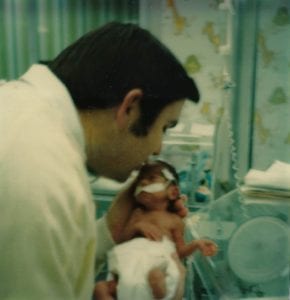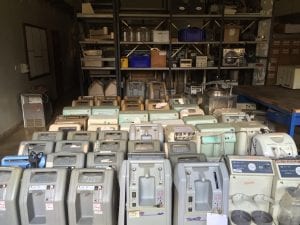I was born at 11:30 p.m. on October 18, 1976. What should have been one of the best days of my parents’ lives quickly turned into one of the most terrifying. Their newborn baby girl was born too soon. Nine weeks early. 3 pounds, 2 ounces. So tiny that I fit perfectly into my dad’s hand.

Midway through her pregnancy with me, my mom was diagnosed with placenta previa, a condition where the placenta sits low on the mother’s cervix, causing bleeding during pregnancy and labor and that is a major contributor to preterm labor. In the mid 1970’s in the United States it was still quite dangerous to be born so early.
I was born at what was then Memorial City Hospital in Houston and immediately transferred by ambulance to Texas Children’s Hospital (TCH), the only neonatal intensive care unit (NICU) in Houston at the time. TCH had the specialized equipment and trained clinical staff to care for babies as small and sick as I was. I was kept in an incubator, where I could be given oxygen, kept warm, and fed by a tube from my nose to my stomach. With this specialized support I grew strong enough to reunite with my parents and brother at home a few months later. We don’t like to think about what could have happened if I did not have access to this state-of-the-art care.
Today, I am the development officer for the Rice 360⁰ Institute for Global Health. For me, it is much more than a job. It is an opportunity to play a very small part in ensuring that the world’s most vulnerable babies have the same chance at survival as I did. Had I been born prematurely 42 years ago in sub-Saharan Africa, my mother and I both would likely not have survived. What is tragic (and unacceptable!) is the same is still true today. Premature birth is one of the leading causes of death in more than 1 million babies in Africa each and every year – a neonatal mortality rate of 28 per 1,000 live births. And their deaths are preventable. We know that because when NICUs and the most basic of its specialized equipment became the standard of care in the United States in the 1970’s, newborn deaths dropped in half to ~15 per 1,000 live births. And with scale up of comprehensive newborn care in the 2000’s, neonatal mortality dropped further to ~5 per 1,000.
Doctors and nurses in Africa do not have access to the right technologies to care for these fragile preterm babies. In my visits to hospitals in low resource communities in Africa, I have seen firsthand rooms full of donated medical equipment from well-meaning donors in the United States and elsewhere – medical devices that are supposed to save lives, but are broken down due to the harsh environment for which they were not intended and not able to be repaired because the parts, tools and/or knowledge are not available.

On this World Prematurity Day, I have hope for a new vision for comprehensive newborn care in Africa. Rice 360⁰’s Newborn Essential Solutions and Technologies (NEST360°) initiative will scale a suite of neonatal technologies that are designed for under-resourced environments: they are effective, affordable and sustainable. NEST360° will establish a system to distribute these lifesaving technologies to hospitals across Africa, train the talented clinicians and nurses who will use them, and develop an ecosystem of engineers on the continent to continue innovating for global health.
Although my parents and I don’t often talk about the first few days or months of my life, I know they are deeply grateful to the doctors and nurses who cared for me—and the technologies that helped me survive. My hope is that millions more babies will have the same opportunity and that millions more parents will experience the joy of such a special day.
It is a great privilege to work with the generous donors who make NEST360° possible. Thanks to all of you for allowing me to share this journey and for believing with us that every newborn, no matter where they are born, has the right to survive and thrive.
-Karen Turney, Director of Development, Rice 360°
For more information on NEST360° or to make a donation, please visit our website at https://www.rice360.rice.edu/nest-360
Karen, we weren’t aware of your exciting beginning on this earth. Probably way more exciting than anyone was prepared for. We sincerely hope your efforts to spread this technology and information far and wide is successful. And we’re very happy that it worked for you at the very scary beginning of your life.
Ron & Fred